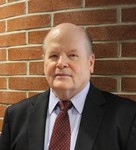Paul Daniel Dapkus
Biography
Paul Daniel Dapkus’ pioneering efforts in realizing metal organic chemical vapor deposition (MOCVD) as a viable fabrication process and using it to develop quantum well (QW) lasers have resulted in the most efficient light sources for applications ranging from telecommunications and optical data storage to high-power industrial processes. MOCVD was developed in 1967, but no devices were created with it until after Dapkus and his team at the Rockwell International Electronics Research Center demonstrated that MOCVD growth technology was capable of producing high-quality layered semiconductor material in 1977. This was at a time when MOCVD was shunned as being not useful compared to molecular beam epitaxy (MBE) or liquid phase epitaxy (LPE). However, his group demonstrated high-performance solar cells and lasers, including ultrathin active regions that led to the first electrically driven QW lasers. MOCVD has since become the dominant technique for production of laser diodes and LEDs as well as photonic devices used in fiber-optic communications systems. His development of strained QW ultralow threshold semiconductor lasers, particularly his work on vertical cavity QW lasers, has led to their very rapid adoption in fiber-optic systems, often as the light source of choice for making low-cost data links. In 1982, Dapkus established a research group at the University of Southern California, where he has continued leading research on advancing the technology of QW devices through MOCVD. His research focuses on high-efficiency, low-threshold lasers; vertical cavity surface emitting lasers; and indium phosphide-based QW lasers at 1330 and 1550 nm wavelengths. Dapkus’ contributions have also been implemented as key products in the diode-pumped fiber laser industry where CO2 lasers used for cutting and welding steel and aluminum have been replaced by MOCVD-grown diode lasers.
An IEEE Fellow, a member of the National Academy of Engineering, and recipient of both the IEEE David Sarnoff Award (2001) and the John Tyndall Award (2015), Dapkus is the William M. Keck Distinguished Professor of Engineering and professor of electrical engineering and physics and astronomy at the University of Southern California, Los Angeles, CA, USA.
